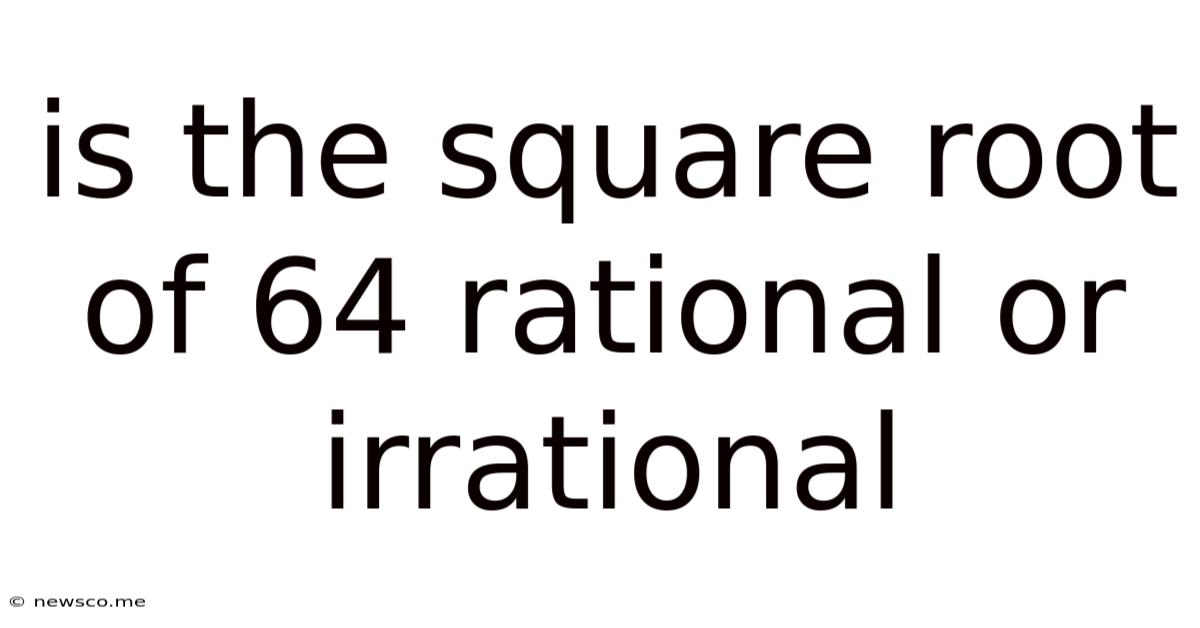Is The Square Root Of 64 Rational Or Irrational
News Co
Mar 26, 2025 · 5 min read

Table of Contents
Is the Square Root of 64 Rational or Irrational? A Deep Dive into Number Theory
The question, "Is the square root of 64 rational or irrational?" might seem simple at first glance. However, understanding the answer requires a solid grasp of fundamental number theory concepts. This article will not only answer this specific question but also provide a comprehensive exploration of rational and irrational numbers, their properties, and how to determine the nature of a number's square root.
Understanding Rational and Irrational Numbers
Before tackling the square root of 64, let's define our terms. Numbers can be broadly classified into two categories:
Rational Numbers: These are numbers that can be expressed as a fraction p/q, where p and q are integers, and q is not equal to zero. Examples include 1/2, 3/4, -5/7, and even whole numbers like 4 (which can be expressed as 4/1). The decimal representation of a rational number either terminates (e.g., 0.75) or repeats (e.g., 0.333...).
Irrational Numbers: These are numbers that cannot be expressed as a fraction of two integers. Their decimal representations are non-terminating and non-repeating. Famous examples include π (pi), approximately 3.14159..., and the square root of 2 (√2), approximately 1.41421...
Determining the Nature of √64
Now, let's address the core question: Is √64 rational or irrational?
To determine this, we need to find the number that, when multiplied by itself, equals 64. That number is 8.
8 can be expressed as a fraction: 8/1. Since 8 and 1 are both integers, and the denominator is not zero, 8 is a rational number. Therefore, the square root of 64 (which is 8) is rational.
Deeper Dive: Properties of Rational and Irrational Numbers
Let's delve deeper into the characteristics of these number types to solidify our understanding.
Properties of Rational Numbers:
- Closure under Addition and Subtraction: The sum or difference of two rational numbers is always a rational number.
- Closure under Multiplication and Division: The product or quotient of two rational numbers (excluding division by zero) is always a rational number.
- Density: Between any two rational numbers, there exists another rational number. This means rational numbers are densely packed on the number line.
- Countability: Rational numbers are countable, meaning they can be put into a one-to-one correspondence with the natural numbers (1, 2, 3...).
Properties of Irrational Numbers:
- Non-Closure: Unlike rational numbers, irrational numbers do not exhibit closure under addition, subtraction, multiplication, or division. The sum, difference, product, or quotient of two irrational numbers may be rational or irrational. For example, √2 + (-√2) = 0 (rational), but √2 * √2 = 2 (rational). However, √2 * √3 = √6 (irrational).
- Uncountability: Irrational numbers are uncountable, meaning they cannot be put into a one-to-one correspondence with the natural numbers. There are infinitely more irrational numbers than rational numbers.
- Density: Similar to rational numbers, irrational numbers are also dense on the number line.
Identifying Rational and Irrational Numbers
Here are some strategies to help determine whether a number is rational or irrational:
- Expressing as a Fraction: If you can express a number as a fraction of two integers (with a non-zero denominator), it's rational.
- Decimal Representation: If the decimal representation terminates or repeats, the number is rational. If it's non-terminating and non-repeating, it's irrational.
- Square Roots: The square root of a perfect square (a number that is the product of an integer multiplied by itself) is always rational. The square root of a non-perfect square is generally irrational. There are exceptions, but they are usually readily apparent.
- Known Irrational Numbers: Familiarize yourself with commonly known irrational numbers like π, e (Euler's number), and the square root of non-perfect squares.
Examples: Determining Rationality
Let's apply these strategies to some examples:
- √25: This is 5, which can be expressed as 5/1. Rational.
- √10: This is approximately 3.162277..., a non-terminating, non-repeating decimal. Irrational.
- 1.75: This can be expressed as 7/4. Rational.
- 0.333...: This is 1/3. Rational.
- √(-9): This involves the square root of a negative number, resulting in an imaginary number, which falls outside the scope of rational and irrational numbers.
Practical Applications and Significance
Understanding the difference between rational and irrational numbers is crucial in various fields:
- Mathematics: It forms the foundation of calculus, real analysis, and number theory.
- Computer Science: Representing and performing calculations with irrational numbers requires special techniques due to their infinite decimal expansions.
- Physics and Engineering: Many physical constants and measurements involve irrational numbers, such as π in calculations involving circles and spheres.
- Geometry: Irrational numbers often appear in geometrical calculations, such as finding the diagonal of a square with sides of length 1 (which is √2).
Conclusion: The Rationality of √64
To reiterate our main point: the square root of 64 is 8, which is a rational number because it can be expressed as the fraction 8/1. Understanding the fundamental difference between rational and irrational numbers allows us to confidently classify numbers and apply this knowledge in more advanced mathematical and scientific contexts. This seemingly simple question opens a door to a fascinating exploration of the nature of numbers and their properties, highlighting the beauty and intricacy of mathematics. This detailed explanation aims to enhance understanding and facilitate further exploration into the world of number theory. Remember to practice identifying rational and irrational numbers using the methods described above to strengthen your grasp of this fundamental mathematical concept.
Latest Posts
Related Post
Thank you for visiting our website which covers about Is The Square Root Of 64 Rational Or Irrational . We hope the information provided has been useful to you. Feel free to contact us if you have any questions or need further assistance. See you next time and don't miss to bookmark.